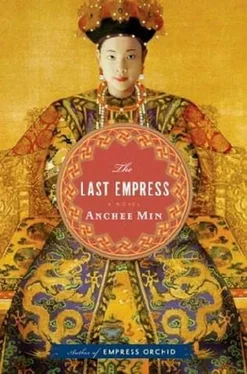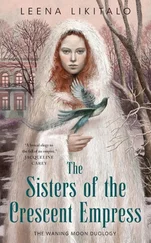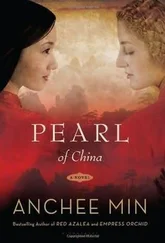Under any other circumstances, I would have considered Pearl's request. I might even have admired her daring. But at this moment all I could see was Pearl's lack of perspective and consideration for my own and my son's safety.
In a way I felt sorry for Pearl, for she trusted in a strength of character Guang-hsu didn't possess. She saw who he might become instead of who he was.
"Take her with us," I instructed Li Lien-ying.
Several eunuchs began to tie Pearl up. She struggled, calling Guang-hsu for help.
He just looked on in despair.
"Guang-hsu," Pearl yelled, "you are the ruler of China, not your mother! The Western powers have promised to treat you with respect. Stand up for yourself!"
Li Lien-ying emptied a cart and the eunuchs hoisted Pearl into it like a sack of rice.
I ordered my son to get into his palanquin, and he obeyed.
Again we began to leave.
Smoke filled the air. The kitchen woks and lids clanged loudly as the bearers walked quickly toward the gate.
The eunuchs pushed the carts while the ladies in waiting walked alongside, carrying my belongings in baskets and cotton bags.
We didn't get far. Before we reached my own gate, Pearl broke free of the cart and ran toward Guang-hsu's palanquin. She pulled down his curtain and hit her head on the side of his palanquin, knocking down one of the bearers.
I stopped my palanquin and yelled her name. I made it clear that she was not going to stay behind.
The girl kissed Guang-hsu's feet, and then in a sudden motion she sprang back toward the Forbidden City.
Li Lien-ying took off after her.
"Leave her alone!" I called.
"My lady, Pearl is running toward the East Gate, where the foreign troops are."
"Let her," I said.
"She could be raped by the foreign soldiers!" "It is her choice."
"My lady, Lady Pearl might also mean to jump into the well."
Against all reason, I ordered our palanquins to turn around. We went after Pearl, back into the city, heading toward the well. We were not fast enough. In front of my eyes, Pearl leapt. But the well opening was too small. Pearl struggled, using her own weight to pull herself down.
"Guang-hsu!" I screamed.
Hiding inside his palanquin, my son made no response. He didn't know what was going on, or didn't want to know.
Using a knife, Li Lien-ying cut loose the longest bamboo stick of my palanquin. With the help of the other eunuchs, the stick was lowered down the well.
Li Lien-ying threw in a rope.
But Pearl was determined to have her way.
Li Lien-ying cursed and threatened. Eunuchs lit fireballs and threw them into the well, trying to smoke the girl out.
"Leave her to her wishes!" Emperor Guang-hsu cried out from his palanquin.
With Pearl's suicide on everyone's mind, we began our seven-hundred-mile journey northwestward and along the Great Wall. We pushed our carts and walked. Guang-hsu sobbed and refused my comfort.
I wondered what would have happened if I had allowed Pearl to have her way. It wouldn't do, I concluded. Once the powers succeeded in "rescuing" Guang-hsu and taking him hostage, we would lose ground in any negotiation. I would be forced to give up everything in exchange for my life, or my son would be forced to order my execution.
"I wouldn't survive either way," Guang-hsu would tell me later.
Nonetheless, my thoughts returned to Pearl as I played out what I might have said to her. She and I had shared the same fantasy, that my son and her husband had within him the power to transform himself. I had labored on that transformation since the day I adopted him. I credited myself for exposing Guang-hsu to Western ideas, and his fascination with Western culture had been my pride. But it hadn't been enough, I would have said.
I would have also let Pearl know that there are truths a mother knows about her child that she can never share with anyone else. The fact that I had been proud of Guang-hsu didn't mean that I didn't know his limitations. I had challenged his potential with all my might. Submitting myself entirely to his call for reform was a personal decision I had made. I had thrown the dice, prepared to lose everything, and I had.
Believing that my son could outmaneuver a man like Ito Hirobumi had been my weakness. Allowing Guang-hsu to appoint Kang Yu-wei as his chief minister was also a mistake on my part. I had known that Kang was not the man he pretended to be, but I'd said yes to please my son.
I had been devastated by my son's suffering. He couldn't accept his own failure, which I considered more mine than his. If I had been murdered on my own son's order, I would have considered it my fate, for I knew how much he loved me.
The most important thing I might have said to Pearl, however, was that my son, her husband, had been up against forces beyond his control: the weight of tradition, the blindness and selfishness of power, history itself. China's great wealth and the glories of its civilization had made it complacent and unfamiliar with change. Resource-poor Japan had been forced to expand, move forward, modernize; the Japanese Emperor had merely led the way for a willing people. China had been surpassed and needed to change, but no Emperor alone could move a nation that was only just wakening to the need for change. No man alone-attempts at such change had already claimed the lives of so many: my husband, my son, Prince Kung, others, and I feared that number would soon include another son.
For the next few weeks we traveled day and night. If we were lucky enough to reach a town by evening, I would get to sleep on a bed. Most days we settled on camping in the fields and forests, where insects crawled all over me. Although Li Lien-ying made sure that I was covered from head to toe, I was bitten on the neck and face. One bite became so swollen that I looked as if I had an egg growing from my chin.
I had summoned Li Hung-chang to begin negotiating with the foreigners, but was told that he hadn't yet left Canton.
There were two reasons Li Hung-chang had been dragging his feet, Yung Lu believed. "First, he considers the negotiation an impossible task. Second, he doesn't want to work with I-kuang."
I understood his reluctance. I had selected I-kuang because the Manchu Clan Council had insisted on having one of their own to "lead" Li.
"I-kuang is ineffective and corrupt," Yung Lu said. "When I questioned him, he complained about Li's overbearing ways and blamed others for 'forcing gifts' on him."
Yung Lu and I were frustrated because all we could do was discuss our misfortune. I told him that Queen Min had visited me in a dream. It began with her rising from a pyre two stories high. "Then she sat by my bed in her burned clothing. She told me how to survive the flames. She didn't seem to realize that she was half flesh and half skeleton. I couldn't understand a word she said because she had no lips."
Yung Lu promised that he would stay near.
Days later, Yung Lu found out the real reason Li Hung-chang had been slow in coming. "The Allies have a list of the people they believe are responsible for the destruction of the legations. They are demanding arrests and punishment before negotiations begin."
"Did Li Hung-chang know about the list?" I asked.
"Yes. In fact he has it, but is afraid to present it to you himself. Here is a copy."
I put on my glasses to read it. Though hardly unexpected, I was still shocked: my name was first on the list.
Yung Lu believed that Li Hung-chang was also reluctant to come to the aid of Guang-hsu yet again. The Emperor had repeatedly been the cause of Li's forced departures, which had resulted in great political and financial losses for Li. His rivals and enemies, mostly the Manchu princes, had gradually taken over his major industrial holdings, including the China Merchants Steam Navigation Company, the Imperial Telegraph Administration and the Kaiping mines.
Читать дальше












